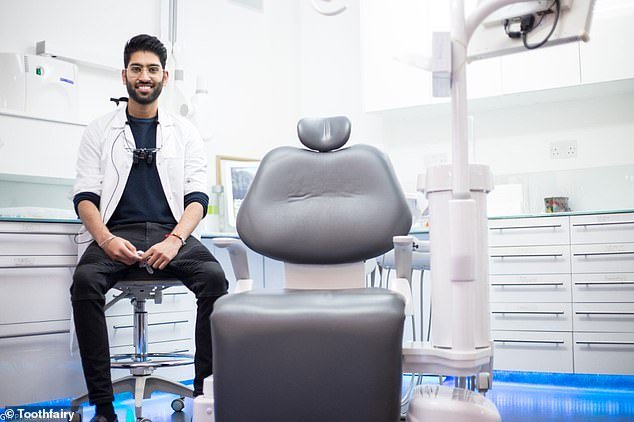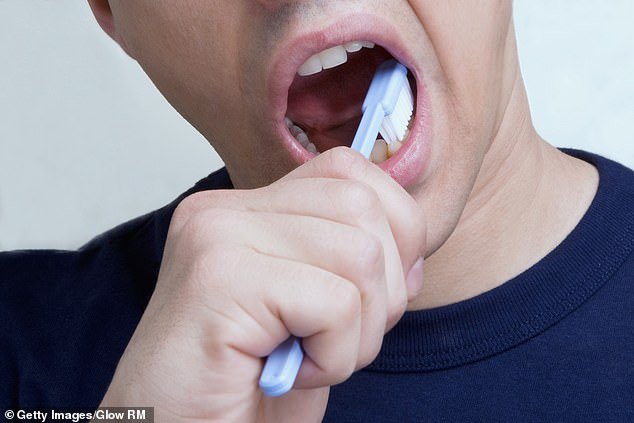I’m a dentist…here are FOUR reasons why snoring damages your oral health and causes bad breath
A leading dentist has revealed why snoring can wreak havoc on your oral health and even cause bad breath.
Most people will snore at some point in their lives, whether it is due to a cold or an illness that affects their ability to breathe through their nose.
However, for 15 million sleepers in Great Britain, grunting and squeaking are a regular problem, according to the British newspaper The Guardian. British Snore and Sleep Anoea Association.
Age, gender, lifestyle choices and weight all contribute to a snoring problem and can also be an indicator of an underlying health problem, according to dentist Dr. Deepak Aulak.
The founder of the AI-powered dental app Tooth fairy shared the impact of snoring on your sparkling smile.
Dentist and founder of AI-powered dental app Toothfairy shared the four effects snoring can have on your oral health
1. Increased risk of oral infections
Snoring all night often leads to mouth breathing, which means less saliva is produced, but waking up with a dry mouth is the least of your worries.
A lack of saliva increases the risk of oral infections, and chronic dry mouth can cause tooth decay and gum disease, as saliva is vital for maintaining good oral health.
Dr. Deepak Aulak said: ‘Regular dental checkups are crucial not only for maintaining overall oral health, but also for specifically addressing dry mouth problems.
‘By regularly monitoring your oral health, we can spot any early signs of dry mouth and implement the appropriate interventions to relieve discomfort and prevent potential complications.’
2. Tooth decay
Bad breath isn’t the nicest smell in the morning, but horrible breath can be an indication of an underlying problem with your oral health.
Dry mouth from snoring increases bacteria buildup, which means less saliva to prevent tooth decay and gum disease.
Dr. Deepak Aulak said, “If someone has complained that you snore, he may be bold enough to tell you a few more painful truths. Do you have bad breath?
‘Snoring dries out your mouth and robs it of that natural defense layer of saliva, which is essential for fighting tooth decay and keeping your teeth and gums clean.
‘If you don’t feel comfortable asking someone if you have bad breath, ask your dentist. You will get an honest answer from the person who can help you treat it.’

The This Morning regular explained that chronic dry mouth caused by snoring can reduce your saliva production and increase the risk of infections and gum disease
3. Gum disease and gingivitis
Dry mouth due to snoring not only causes tooth decay, but can also cause gingivitis and more serious gum disease such as periodontal disease.
Gingivitis is the first stage of gum disease, caused when plaque, tartar and bacteria build up on the teeth, leading to red, swollen and bleeding gums.
If left untreated, the condition can develop into periodontal disease, which attacks the soft tissue around the teeth and causes tooth loss.
Interrupted sleep caused by snoring or sleep apnea can increase inflammatory markers in the blood, which can worsen gum disease.
Dr. Deepak Aulak said, “If you see blood in the sink after brushing your teeth or notice a bad odor after flossing, these could be the first signs of gum disease.
‘In the initial stages it can be easily treated with special toothpastes and mouthwashes, but when the disease takes deeper root, you know: it is very painful.
‘Regular dental checkups are essential not only for the early detection and treatment of gum disease, but also for general preventive care.
‘In addition to professional dental visits, maintaining good oral hygiene at home is crucial.
‘This includes brushing teeth twice a day, flossing regularly and using antimicrobial mouthwash to reduce plaque buildup and minimize the risk of gum disease.
‘By combining regular dental check-ups with consistent oral care at home, we can effectively prevent gum disease from developing and reduce the risk of more serious complications.
“Snoring may not seem like a problem to you right now, but addressing it can save you from real problems later.”

More serious types of gum disease, such as periodontal disease, can weaken your gums, resulting in tooth loss (stock image)
4. Tooth loss
Severe gum disease, or periodontal disease, weakens the soft tissue that supports the teeth, causing you to lose teeth in some severe cases.
Losing teeth changes the shape of the mouth, which sometimes causes the airways to narrow – and even affects the way the person’s tongue rests when they sleep.
As a result, tooth loss also causes sleepers to snore.
Dr. Deepak Aulak said: ‘Tooth loss due to gum disease is the ultimate result of long-term poor oral hygiene. And snoring can contribute to that.
Snoring is also something a dentist can advise on, as problems with your teeth and gums can affect your breathing during sleep.
Dr. Aulak said, “Snoring is more than just a frustration for you and anyone within earshot to tolerate.
‘It is often indicative of underlying health conditions that can significantly impact your quality of life – and also lead to oral health problems.
‘Snorers often sleep with their mouth open, which causes the mouth to dry out and the amount of saliva to decrease.
‘We need saliva to ensure that our teeth and gums stay healthy. The result is more bacteria, which potentially means gum disease, tooth decay and even tooth loss.
Dr. Deepak regularly added this morning: ‘If you are concerned about snoring, contact both a dentist and a doctor.’
